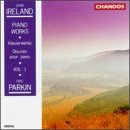| All Artists: Eric Parkin Title: Decorations / The Almond Tree Members Wishing: 0 Total Copies: 0 Label: Chandos Release Date: 10/28/1992 Genre: Classical Styles: Forms & Genres, Sonatas, Historical Periods, Modern, 20th, & 21st Century Number of Discs: 1 SwapaCD Credits: 1 UPC: 095115905623 |
Search - Eric Parkin :: Decorations / The Almond Tree
 | Eric Parkin Decorations / The Almond Tree Genre: Classical
|
Larger Image |
CD Details |
CD ReviewsDIGRESSIONS (ON): IRELAND PIANO MUSIC (COMPLETE) (PART 1) Melvyn M. Sobel | Freeport (Long Island), New York | 08/01/2001 (5 out of 5 stars) "Piano works of enduring quality and quantity have never been English music's strong suit. Not, for example, like that of France, with her Debussy, Ravel, Faure, Satie, Poulenc and Milhaud, to venture a few; nor Germany, the virtual mother lode, whose piano composers rank, undeniably, amongst the greatest ever born. When considering British piano music, three composers come to mind: Ireland, Bridge and Bax, all of whom wrote more than merely a smattering of works for the instrument. (Of course, the efforts of Elgar, Moeran, Berkeley, Howells, et al., are not to be slighted--- but these are exceptions to fact, more incidental output than sustained.)
John Ireland (1879-1962), however, is arguably the cornerstone of British composers for the piano (with Frank Bridge a close second), and Eric Parkin, a former Ireland student, his most sympathetic advocate and champion. [Parkin was the first pianist to record Ireland's complete piano oeuvre in stereo on English Lyrita LPs--- late 70s into early 80s. Other pianists, like Daniel Adni (1982) and Desmond Wright (@1995) have released an LP and CD, respectively, of Ireland collections; and, now, for Naxos, John Lenehan has completed a recent second CD (2000) in his ongoing series.] So, it seems more than obvious that the greatest composer of English piano music has been sadly neglected--- especially under the circumstances. This is why Parkin's second stereo/digital traversal of Ireland's piano output on three Chandos CDs is so critical an issue. Volume 1 (released in 1992) opens beautifully with Ireland's three DECORATIONS (1912), his admitted homage to Debussy's premiere book of piano PRELUDES (1910). Here is our first glimpse of Ireland's magic, the thread of his thematic penchants and the general ambient mood, nostalgia, sensitivity and tenderness so imbued in the majority of his piano works. In "The Island Spell" and "Moonglade," for example, one need go no further than to conjure in his mind's eye the sheer mystery that these titles imply and, then, to allow the music to spin out its wonderful dream-like reveries. Ireland is indeed a painter of musical mood poems, fully realized in THE ALMOND TREE (1913) and, from the four PRELUDES (1913-15), "The Undertone" and the reverentially beautiful "The Holy Boy," whose melody is so enchanting. The RHAPSODY (1915), a more full-bodied, substantial work, gives us glimpses of Brahms and Reger, whose own "rhapsodies" are like dark, penetrating ruminations. Here's a piece that proves Ireland no mere miniaturist only. From its brooding beginning, the RHAPSODY develops an ebb and flow, its central section rippling surprisingly along, ghost-like, before returning to its initial development and climax. The following three works, THE TOWING PATH, MERRY ANDREW and SUMMER EVENING (1919), return us to the wistful English nostalgia so pervasive and beautiful in Ireland's piano music, and his fabulous hallmark. SUMMER EVENING is particularly lyrical and endearing, gentle and heartfelt, especially in its yearning. The concluding PIANO SONATA IN E MINOR seems a distillation: In its first movement Allegro, we hear echoes of "The Island Spell," the very opening track of the CD, transformed and energized, and some of the more dramatic evocations of "Fire of Spring" (the fourth of the PRELUDES). The second movement Lento, lasting nearly ten minutes, is a gorgeous, hymn-like chordal sequence very reminiscent of Satie (e.g. GYMNOPEDIES). It's awash with a kind of "spirituality" unusual in Ireland's work. The Con moto finale is a perpetual motion of contrasts and thematic recapitulations that builds to a glorious, triumphant conclusion. Brilliantly-conceived, this altogether satisfying twenty-five minute work brings us full circle. Parkin, without a glimmer of a doubt, is the soul and substance of Ireland, his mentor, and undeniably an excellent advocate of his music. The totality of his immersion, and the sensitivity to every nuance these works offer is inspired. His recordings of Ireland's piano works will remain the milestones against which all performances must be compared. [Running time: 76:51] " |

 Track Listings (15) - Disc #1
Track Listings (15) - Disc #1